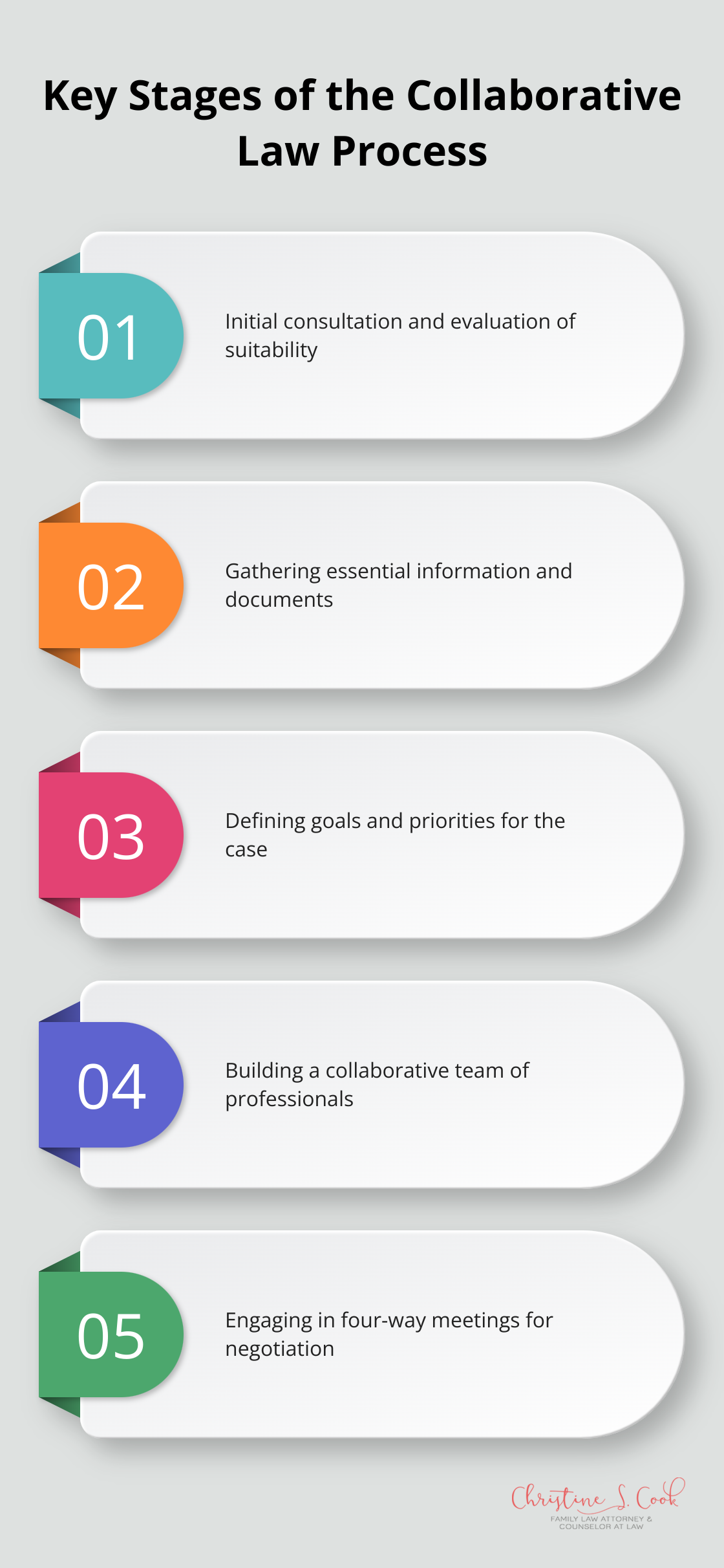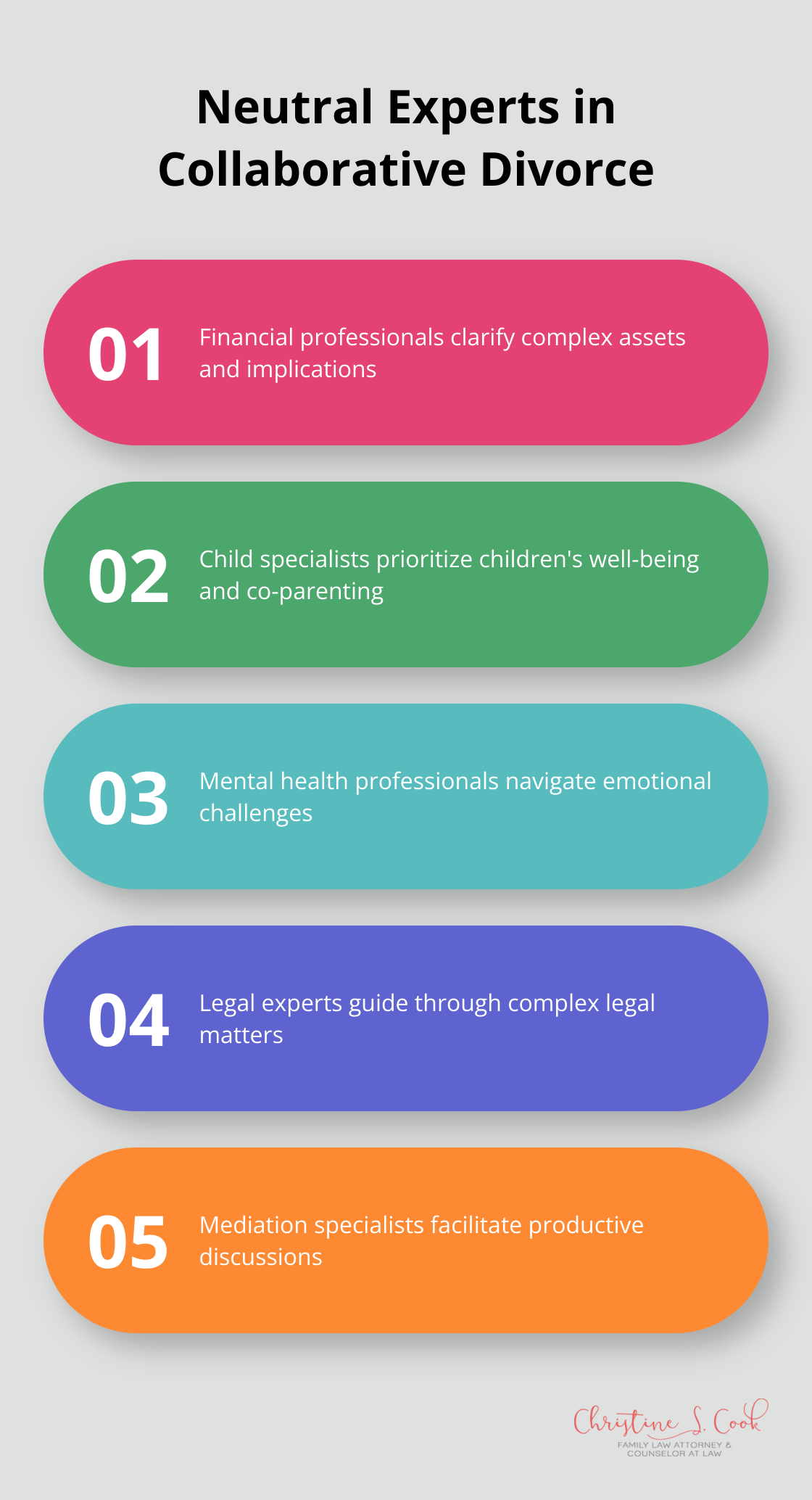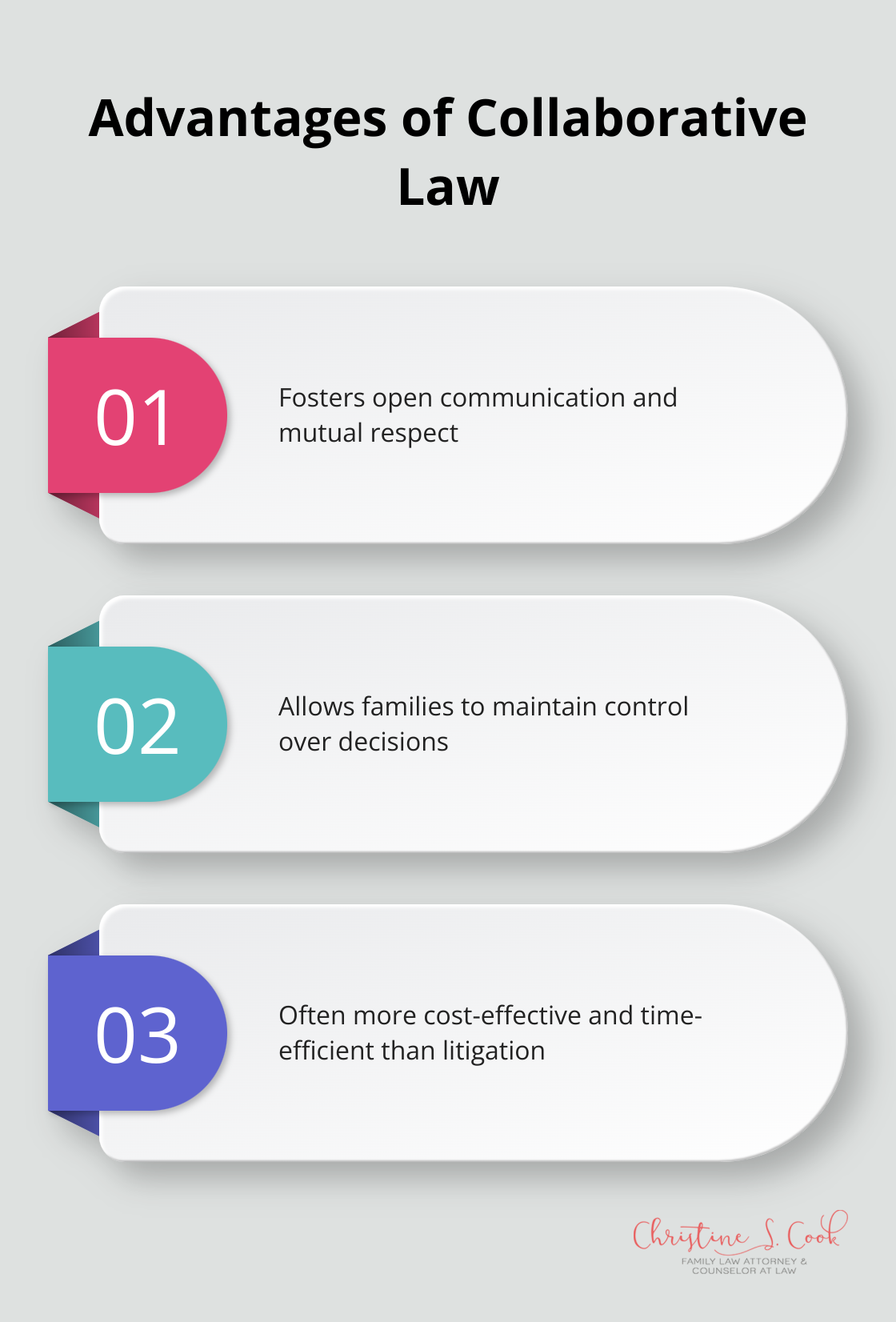At Christine Sue Cook, LLC, we understand that divorce can be a challenging process. The collaborative law process offers a unique approach to resolving family disputes.
This method focuses on open communication, mutual respect, and finding solutions that work for everyone involved. In this blog post, we’ll explore the key stages of collaborative law and how they can benefit families seeking a more amicable resolution.
The collaborative law process starts with an initial consultation and preparation phase. This approach focuses on open communication, mutual respect, and solutions that benefit all parties involved. Unlike traditional litigation, collaborative law resolves disputes without court intervention, which allows parties to maintain control over the process and outcome, and can be more efficient and cost-effective.
We assess whether collaborative law suits your specific case. This involves a frank discussion about your willingness to cooperate, your ability to communicate effectively with your spouse, and your commitment to finding mutually beneficial solutions. Couples who prioritize compromise and their children’s well-being often achieve the best outcomes through this process.
After determining that collaborative law fits your needs, we guide you through the collection of necessary documents and information. This typically includes financial records, property valuations, and relevant personal documents. Thorough preparation at this stage streamlines the negotiation process later on.
The final step in this initial phase involves setting clear goals and priorities. We work with you to identify what matters most in your divorce or family law case. Your priorities (which may include maintaining a positive co-parenting relationship, ensuring financial stability, or protecting specific assets) shape the direction of negotiations.
As you prepare for the collaborative process, we help you assemble a team of professionals to support your case. This may include financial advisors, child specialists, and mental health professionals (depending on your specific needs). A well-rounded team ensures that all aspects of your case receive expert attention.
The initial consultation and preparation phase sets the foundation for a successful collaborative law process. Clients who approach this phase with dedication and openness increase their chances of achieving satisfactory outcomes in their family law matters. As we move forward, we’ll explore the next critical stage: the four-way meetings, where both spouses with their legal counsel and often jointly-retained financial experts meet to begin the real work of negotiation and problem-solving.

Four-way meetings form the core of the collaborative law process. These sessions unite both spouses and their attorneys to address the issues at hand. The meetings start with the establishment of ground rules and expectations, which creates a respectful and productive environment. Participants agree on guidelines such as speaking one at a time, avoiding interruptions, and maintaining a focus on problem-solving rather than blame. These rules keep discussions on track and emotions in check.
After ground rules are set, the focus shifts to identifying specific issues that require resolution. This step includes property division, child custody arrangements, spousal support, and other relevant matters. A clear outline of these topics ensures that nothing is overlooked and all parties understand what needs to be addressed.
The collaborative process hinges on open and honest information sharing. During four-way meetings, both parties provide full disclosure of all relevant documents and details. This transparency builds trust, promotes respect, and empowers divorcing parties to make well-informed decisions that protect their financial interests. Financial records, property valuations, and other pertinent information are shared and discussed openly (this openness is a stark contrast to the often adversarial nature of traditional litigation).
With issues identified and information shared, the focus moves to solution brainstorming and agreement negotiation. This stage showcases the true strength of the collaborative process. Instead of adversarial positioning, all parties work together to find innovative solutions that address everyone’s needs and concerns. Couples often develop unique custody arrangements or property division solutions that a court might never consider (these creative outcomes can lead to more satisfying and sustainable agreements).
Throughout these meetings, attorneys guide their clients through the process. They ensure their clients’ interests are represented while maintaining a collaborative spirit. The goal is to reach agreements that work for each family’s unique situation, setting the stage for a more positive future post-divorce.
As the four-way meetings progress and agreements take shape, the collaborative process often benefits from the expertise of neutral professionals. These specialists play a vital role in providing unbiased information and support to both parties, further enhancing the collaborative approach.
In many divorces, financial matters can become complex and contentious. Neutral financial professionals play a crucial role in asset valuation and financial planning. These experts analyze financial records, assess property values, and provide objective insights into the financial implications of various settlement options. A Certified Divorce Financial Analyst® (CDFA®) can assist the client and their lawyer in understanding how financial decisions made during the divorce process will impact their financial future.
When children are involved, the collaborative process often includes input from child specialists. These professionals, typically child psychologists or family therapists, focus on the children’s emotional needs and help parents develop effective co-parenting strategies. They assist in creating custody arrangements that prioritize the children’s well-being and stability.
Divorce often becomes an emotionally charged process. Mental health professionals in the collaborative team help manage these emotions and facilitate productive communication between spouses. They provide coping strategies, help parties process grief or anger, and ensure that emotional issues don’t derail negotiations.
While each spouse has their own attorney, neutral legal experts can provide additional guidance on complex legal matters. These professionals offer unbiased interpretations of laws and regulations, helping both parties understand their rights and obligations. They can clarify intricate legal concepts and ensure that all agreements comply with state and federal laws.
In some cases, a neutral mediator can enhance the collaborative process. These specialists facilitate discussions, help parties find common ground, and propose creative solutions to seemingly intractable issues. Mediation specialists excel at breaking deadlocks and moving negotiations forward when they stall.

The collaborative law process offers a refreshing alternative to traditional divorce litigation. This approach fosters open communication, mutual respect, and creative problem-solving, which often leads to more satisfactory outcomes for all parties involved. Unlike courtroom battles, collaborative divorce allows families to maintain control over their decisions and prioritize their unique needs.

Collaborative law preserves relationships, especially when children are involved. Couples who work together to find solutions lay the groundwork for more positive co-parenting relationships post-divorce. This approach also tends to be more cost-effective and time-efficient than traditional litigation, as it avoids lengthy court proceedings and encourages swift resolution of issues.
We at Christine Sue Cook, LLC strongly encourage considering the collaborative law process for those facing divorce or other family law matters. Our experienced team dedicates itself to guiding clients through this innovative approach, ensuring their interests receive protection while striving for amicable resolutions. To learn more about how collaborative law can benefit your situation, visit our website for a free consultation.
